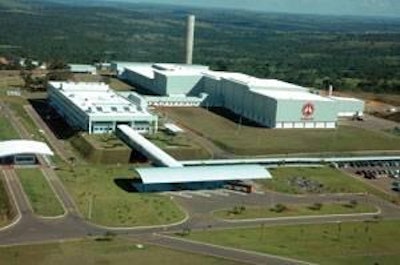
Twelve months after a hostile takeover attempt, in which Sadia tried to buy Perdigão, Brazil's top two poultry producers reversed positions. Perdigão passed Sadia when it finalized an acquisition of Eleva Alimentos in February.
Takeover bid spurs Perdigão growth
The unsuccessful takeover attempt in 2006 spurred Perdigão to revise its business strategies and enter an accelerated growth mode with a goal of strengthening the company and reducing vulnerability for future takeover bids. To insure survival, the company began aggressively pursuing growth domestically and within the global market. Focusing on different business areas and not just meats, and supported by a significant investment program, Perdigão went shopping.
During the first part of 2007, the company acquired Sino dos Alpes for $4.8 million dollars. A small, specialty poultry meat and pork products company located in southern Brazil, the division was a subsidiary of Grandi Salumifici Italiani, a traditional Italian sausage producer with more than 150 years of experience and operations in 11 countries. In the same month, Perdigão opened the Mineiros, Goiás State complex, in Brazil's mid-western region, with an annual capacity of 81,000 tons of processed heavy poultry meat-based products (turkey and the Chester brand roaster), expanding production.
European expansion
An established supplier of raw materials and finished products for the European market, Perdigão's strategy of entering the European Union's retail market with its own brands had not been successful. Company executives chose an alternative strategy of diversification, investing in more sophisticated products for higher market segments.
After two years of negotiations, the company finalized the purchase of Plusfood, a Dutch meat processing company, for 30 million ($46.29 million). With plants in The Netherlands, the United Kingdom and Romania, Plusfood has an annual income of about 75 million ($115.72 million), selling 20 thousand tons of hamburgers, nuggets, and grilled products under the Friki brand of poultry products, and Fribo brand of beef products, in addition to a strong presence in the food service market. Prior to being acquired by Perdigão, the company belonged to Cebeco Groep B.V., a Dutch co-op holding with over 200 subsidiaries in 100 countries, 40,000 associated producers and annual income of 3.4 billion ($5.25 billion).
According to Perdigão, the acquisition's main goal was to move up in the value chain with sales reaching European market end-consumers in the retail and foodservice segments. The purchase also enabled the company to perfect new products for EU consumers, become more effective with deliveries and gain total control over sales and distribution services.
Perdigão has other international investments scheduled for beyond 2011.
To celebrate 73 years in business, the company opened the Nova Mutum poultry processing plant extension projects in Mato Grosso State in western Brazil, with a capacity of 280,000 birds per day. It bought the Gale Agroindustrial poultry complex in Jataí, Goiás, in Brazil's Midwest. This facility, along with the one in Rio Verde, processes 500,000 birds a day.
Perdigão also returned to beef production, a business they had left in the 1990s and reentered in 2005 by leasing a third-party unit, acquiring industrial facilities in Mato Grosso and Paraná states. Based on Perdigão's plans to acquire or build new facilities, today's 500-head per day of beef cattle operation should reach 6,000 head per day in 2009 and 8,000 per day by 2011.
Dairy and sausage diversification
Already in the margarine market with house brands, the company closed a deal with Anglo-Dutch conglomerate Unilever to acquire their Doriana, Claybom and Delicata margarine brands, which Unilever continues to produce. The agreement still contemplates the creation of a joint venture between the two companies to manage the Becel and Becel ProActive premium product brands. Unilever licensed the use of these brands, which can be used in other Perdigão product lines. This agreement accelerated Perdigão's growth in the margarine segment.
Perdigão added the remaining 49 percent of Batavia stock, a traditional southern Brazilian dairy, to the 51 percent it had acquired in 2006. It now has full control of the company that processes 63.4 million gallons of milk a year.
Brazil's northeastern region, with a 15 percent economic growth rate per year, was selected as Perdigão's new manufacturing base. Investing $140 million dollars, the company plans to open a Batávia unit in the state of Pernambuco to process 100,000 liters (26,420 gallons) of milk per day, possibly reaching production levels up to 300,000 liters (79,260 gallons), to yield some 125,000 metric tons of products a year. A sausage, traditional cold cuts and bologna manufacturing site with a capacity for 120,000 metric tons per year, and a distribution center are also planned.
Perdigão takes over
In February 2008, Perdigão acquired Eleva Alimentos, previously Avipal, one of Brazil's most important poultry, swine and dairy producers, based in Rio Grande do Sul. According to Perdigão, 46 percent of the nearly $1.7 billion dollar purchase was paid in cash with resources gained through public offerings and the remaining 54 percent through the incorporation of shares. This purchase, made a little over 12 months after the hostile takeover attempt, gave Perdigão the lead in sales for the Brazilian poultry and pork meat processing.
A company press release reported that Perdigão closed 2007 with gross invoicing of nearly $4.3 billion dollars, a 27.6 percent increase over 2006 figures. Its net income for the year grew 174 percent, to $170 million dollars.
Perdigão's rapid growth came from strong domestic market and export performance, along with scale and productivity profits and a share increase in sales for processed products in the company's total net sales, reaching 53 percent. These factors, along with the Batávia's dairy activities, the margarine business, and the beef cattle acquired during the year, fueled their 27.3 percent gross income growth, accumulating $3.4 billion dollars in 2007.
As Perdigão continues it growth, Sadia, now second in the Brazilian poultry market is expanding its businesses and investments, perhaps to regain its market leadership. Brazil's meat industry and overall economy are reaping the benefits of the tremendous growth of its two top meat producing companies.

















